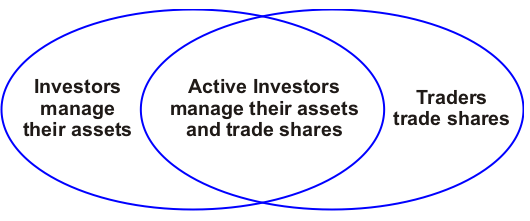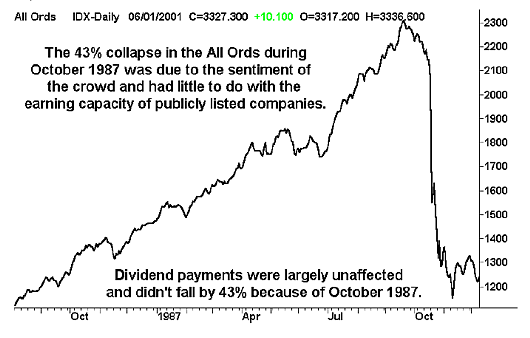- Active Investing - what is it?
- All Weather Trading Plan using Complex Theory (Parts 1 - 4)
- Asset Management (Parts 1 - 4)
- Back Testing
- Breaking out from consolidation
- Breakout trading in all market conditions
- Charting in a Nutshell
- Children of the Bear
- Fibonacci and the Golden Ratio
- Going Public
- Hull Moving Average
- MACD Breakout Trading (Parts 1 - 2)
- Making decisions with a Simple Moving Average
- Probability: do you have the stomach for it?
- Profit Taking
- Relative Strength
- Record Keeping
- Risky Business
- Short Selling
- Social Media Bubble
- Switching Gears
- Rate of Return indicator
- Time and Money
- Tools of the Trade
- Trade Warrants (Parts 1 - 4)
- Trading without spending money
- Trendlines
- Triangles
- GMMA's on Weekly Charts
- Writing Custom Indicators
Articles include:
Although it is an aspect of Active Investing that I rarely address, asset management is very much a part of the overall Active Investing philosophy. As Active Investors we can have a foot in both the 'Investing' camp and the 'Trading' camp at the same time.

This series of articles on asset management will start with a refresher course on what asset management is and finish by looking at a specific example of a possible asset. But to fully understand what Asset management is, it pays to know the answers to the following questions.
- Is there a difference between the value of shares and the Companies they represent?
- What is the difference between investing and trading?
The best place to start is by understanding the difference between shares and the underlying companies that they represent. The difference is the crowd. The crowd being the market participants, who collectively place a value on companies via their share price.
Example
If there are 10 million shares issued for ABC company and the shares are trading at $2 each then the market capitalization or the value that the market places on the company is: 10,000,000 shares x $2 = 20 million dollars.
If the shares are sold down to $1 each then the market has halved the value it places on ABC company: 10,000,000 shares x $1 = 10 million dollars.
The key point here is that the share price may alter without any change in the performance of the underlying company, its management or future prospects. In theory, the value which market participants place on a company and the actual value of the company in terms of its assets and earnings, should be one and the same... in theory.
But the crowd forms a slippery barrier between the value of the shares and what the company is actually worth. The crowd may value the shares using factors that have little or nothing to do with the company itself. Whilst this may seem to be an unwanted complication, it is the very reason for the marketplace's existence. If we could place a value on shares using solid facts then the stockmarket would probably cease to exist as the volume of trading would dry up.
Items with a fixed value can't be traded in a marketplace. (You wouldn't pay $60 for a $50 note, nor would you sell a $50 note for $40.) Shares are in fact an intangible representation of tangible companies. The two components are linked together via us, the crowd. But although we own public companies by possessing shares in them, it is important to differentiate between shares and the public companies they represent.
In the following chart of the All Ordinaries you can see how the crowd effectively devalued Australian Public Companies by 43% during the stockmarket crash of 87'. This devaluation had virtually nothing to do with any change in the performance of the Public Companies.

The next point requiring clarification is the difference between investing and trading. To understand the difference is extremely difficult when investing is defined as applying or using money to create profits and/or devote time and effort to an enterprise. One could include, by this definition, any undertaking that involves putting effort into realizing either profits or savings.
Apart from making the expression 'Passive investing' a contradiction in itself, this definition makes everyone present in the marketplace an investor of sorts. So we will differentiate between investors and traders by coming at the issue from the other end. Traders, by definition, are individuals who buy and sell products for profit. Most of us think of traders as the people who run retail stores selling tangible goods. Stockmarket traders are doing exactly the same but they don't have retail stores.
They are generally perceived to be working in a shorter timeframe than investors but this is a commonly held misconception as traders themselves are a type of investor. The time that a share is held for or the number of buy and sells orders executed by an individual in a given space of time has absolutely no bearing on whether they are a trader or an investor.
If we eliminate everyone in the stockmarket who is buying and selling shares for profit, ie. traders, then we are left with the people who use shares or companies as assets. Hence, we will define investors as individuals who own shares in publicly listed companies as assets. Now that we have defined shares, companies, traders and investors we can look at all the options that are available to us. The following four combinations are possible.
- We can invest in companies
- We can invest in shares
- We can trade companies
- We can trade shares
Asset management is defined as option 1 - investing in companies. The next article will take an in-depth look at the theory and practice of investing in publicly listed Companies.
|